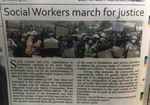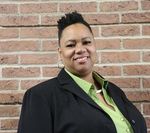Denise Kingdom Grier - South Africa
←
→
Page content transcription
If your browser does not render page correctly, please read the page content below
Denise Kingdom Grier – South Africa
It’s no secret that 2020 demanded nothing short of a pivot and aim for missions locally
and abroad. It truly was a lesson in following the Spirit daily for our team at SFCS.
Given the COVID-19 pandemic and the country lockdown, adoptions, foster care
placements, and church engagement activities were below target. The pandemic
rendered entrepreneurs without a market to see their goods. Upwardly mobile families
waiting to adopt had to find rations for themselves and could not consider placements as
they would have been pre-pandemic.
I was grateful to have traveled to Botshabelo in February just before the outbreak and was able to witness first-
hand the excitement of children placed in loving families. The staff was refreshed by our team's
encouragement and by the support of North American partners. The local stakeholders in the Free State
gathered to strategize ways to continue to collaborate for the flourishing of vulnerable children in their region.
Blessings of 2020
When the COVID-19 pandemic hit South Africa, our President was
forced to put the country on a 21-day national lockdown.
Unfortunately, in the first week of this lockdown about 87,000 cases
of Gender-based Violence (GBV) and/or domestic violence (DV)
were reported across South Africa. Then the lockdown lasted for
many months.
But God put Setshabelo Family and Child Services (SFCS) in
Botshabelo for a reason and they responded immediately. Working
with South African Police Services (SAPS), they set up camp at the
two police stations in this township of 250,000 people to partner
and assist with GBV and DV cases. SFCS’s mission is safe and loving
families for every child, and GBV and DV are our greatest threats
against children and safe, loving families.
One couple had been married for 26 years, with three children. This
case came to our office because the wife had tried to commit
suicide. Once the health care workers at the hospital found out,
they called the police who tried to get her to open a case. But she
refused and asked the officers to go reprimand him instead. So they
sent her to the Director of SFCS Mrs. Keabetsoe Sekoboto (Kaybe).The wife retells how violent her husband was and that it led her into depression. In their counseling sessions, she opened up and told Kaybe that the abuse had also affected her children. They had become bitter and angry. The 21-year-old son beat up his father for abusing them and his mother so much that the father was in the process of opening a case against his son. This is when Kaybe called the children in and counseled them individually. In their sessions, Kaybe found that the father would beat up the children as well—they grew up in violence and had hate towards their father. Their 25-year-old daughter dreamed of finding poison and killing her father. Counseling sessions helped the wife reconstruct her self-identity and life. Kaybe then helped the children, too. The father also came to SFCS as the perpetrator who felt he was in the right because he grew up with an abusive father himself. For him, this was “love.” After several family counseling sessions, a family conference helped the father to ask for forgiveness as they continue healing. This family gives us the confidence to know that the interventions SFCS does work to serve the entire family. Challenges of 2020 Food insecurity and GBV were the greatest challenges that exacerbated Botshabelo by the pandemic. SFCS added to their very full plate of responsibilities COVID-19 awareness and the importance of wearing masks, distributing food rations, and, most recently, helping families cultivate gardens especially those on Antiretroviral medications for HIV who require a special diet to metabolize the meds. GBV has skyrocketed in South Africa due to the lockdown. Reports of brutal rapes of young girls and women leave SFCS to provide the psycho-social counseling and support necessary to help families heal. They have also had to increase their education to men and boys about GBV. In late 2020, they launched a campaign called “Count me in campaign” with community partners to end GBV in South Africa. Learnings from 2020 SFCS has much to teach about agility in times of crisis. They are committed to orphaned and vulnerable children and realize that to support them, the entire family needs support to end cycles and behavior that lead to the existence of orphans and vulnerable children. They have their finger on the pulse of their community and become aware of the needs often before church, police, or school become aware. Hopes for 2021 We are looking forward to: The flourishing of community gardens for sustainability amidst a pandemic. A lifting of the pandemic to open families to adoption with a concern of exposure. Increase in funding for our staff, some of whom have been severely unpaid for the amount of work they do. Safety for our staff as they travel via public transportation to and from work during COVID-19 and an uptick in GBV.
How We Can Pray
Pray for the safety of our staff as several have tested positive for COVID-19. A staff of 20 can be debilitated if
even one person is out due to illness.
Pray for our staff to find healing from the violence they experience, that they will not be traumatized, and
find ways to release the burden.
Pray for the children in Botshabelo waiting for their adoptive families who must readjust to be able to
receive them into their homes.
Pray for victims and perpetrators of DV and GBV. Pray that God’s Shalom would quench, heal, and renew
with new life and wholeness.You can also read























































